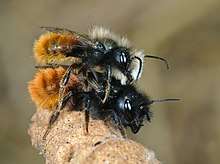Osmia cornuta
Osmia cornuta, the European orchard bee, is a species of bee in the genus Osmia found in southern and central Europe, north to Belgium, and the southern parts of the Netherlands. The first record of this bee in Great Britain occurred in 2017.[1] They are of the solitary type; they do not live in colonies in hives like bumble bees and honey bees. They lack the pollen baskets on their hind tibiae; they do not produce honey, but they do use the pollen and nectar to stock their nests when they are ready.
| Osmia cornuta | |
|---|---|
 | |
| Scientific classification | |
| Kingdom: | Animalia |
| Phylum: | Arthropoda |
| Class: | Insecta |
| Order: | Hymenoptera |
| Family: | Megachilidae |
| Genus: | Osmia |
| Species: | O. cornuta |
| Binomial name | |
| Osmia cornuta (Latreille, 1805) | |
| Synonyms[1] | |
| |
O. cornuta is also known as the builder bee, because when they build their nests in either the ground or structures that allow them to lay their eggs, usually the female digs to find an adequate nest. They build them with debris they have found in their habitat. They store pollen and for the larvae so they can feed themselves as they are left to fend for themselves. Once the larvae are in their adult form, they dig their way out of the nests and begin their adult lives as solitary bees.[2]
Their length varies from 10 to 15 mm. Adults are on wing from March to June. The best way to ensure to have bees in the garden is to provide an insect hotel, which has adequate facilities to allow them to lay their eggs.[3]
| Wikimedia Commons has media related to Osmia cornuta. |
References
- "Osmia cornuta Latreille 1805". Bees, Wasps and Ants Recording Society. 2017. Retrieved 14 May 2017.
- Royal Entomological Society
- Making a bug Hotel, RHS